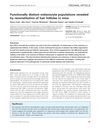TLDR Wnt signaling is crucial for pigmented hair regeneration by controlling stem cell activation and differentiation.
The study explored the importance of Wnt signaling in the regeneration of pigmented hair, focusing on the interaction between epithelial stem cells (EpSCs) and melanocyte stem cells (McSCs). It was found that Wnt signaling is essential for the coordinated activation and differentiation of these stem cells within the hair follicle. Activation of Wnt signaling in McSCs leads to their differentiation into pigment-producing melanocytes, while in EpSCs, it triggers hair follicle formation and controls McSC proliferation. The study used genetic mouse models to demonstrate that Wnt signaling serves as both an intrinsic and extrinsic regulator for these stem cells. The research also showed that constitutive stabilization of β-catenin in McSCs causes premature differentiation and loss of these cells, leading to premature hair graying, while loss of β-catenin inhibits melanocyte proliferation and differentiation, also resulting in gray hair. The study involved more than 15 mice from five litters for gray hair coat observation, 10 mice from more than four separate litters for pigmentation analysis, and over 60 longitudinal hair follicle sections from at least three different mice for immunohistochemical and histological analysis. The findings suggest that targeting Wnt signaling could be a potential strategy for treating pigmentation disorders and that the coordinated action between EpSCs and McSCs is crucial for pigmented hair regeneration.
283 citations
,
February 2011 in “Cell stem cell” COL17A1 is crucial for preventing hair graying and loss by supporting hair and pigment stem cells.
 1039 citations
,
February 2009 in “Nature Reviews Molecular Cell Biology”
1039 citations
,
February 2009 in “Nature Reviews Molecular Cell Biology” Skin stem cells are crucial for maintaining and repairing the skin and hair, using a complex mix of signals to do so.
 326 citations
,
February 2009 in “The American journal of pathology”
326 citations
,
February 2009 in “The American journal of pathology” Lgr5 is a marker for active, self-renewing stem cells in the intestine and skin, important for tissue maintenance.
193 citations
,
May 2008 in “Development” Activating β-catenin can turn skin cells into hair follicles.
 829 citations
,
May 2007 in “Nature”
829 citations
,
May 2007 in “Nature” Hair follicles can regrow in wounded adult mouse skin using a process like embryo development.
40 citations
,
November 2005 in “The journal of investigative dermatology/Journal of investigative dermatology” Different melanocyte types in hair follicles either survive or die during the catagen phase.
1279 citations
,
November 2005 in “Nature Medicine”  384 citations
,
June 2005 in “Genes & development”
384 citations
,
June 2005 in “Genes & development” β-catenin is essential for stem cell activation and proliferation in hair follicles.
387 citations
,
November 2003 in “Journal of Investigative Dermatology” The K15 promoter effectively targets stem cells in the hair follicle bulge.
561 citations
,
April 2003 in “Journal of Investigative Dermatology” CD34 is a marker for isolating stem-like cells in mouse hair follicles.
 April 2023 in “Journal of Investigative Dermatology”
April 2023 in “Journal of Investigative Dermatology” Blocking casein kinase 1 in skin cells can help melanocyte precursors move better, potentially helping with conditions like vitiligo or gray hair.
 240 citations
,
April 2011 in “Pigment Cell & Melanoma Research”
240 citations
,
April 2011 in “Pigment Cell & Melanoma Research” Melanocyte stem cells in hair follicles are key for hair color and could help treat greying and pigment disorders.
 10 citations
,
November 2010 in “Pigment Cell & Melanoma Research”
10 citations
,
November 2010 in “Pigment Cell & Melanoma Research” Only skin melanocytes, not other types, can color hair in mice.
 75 citations
,
January 2009 in “International journal of trichology”
75 citations
,
January 2009 in “International journal of trichology” Hair grays due to oxidative stress and fewer functioning melanocytes.









